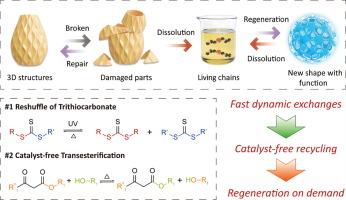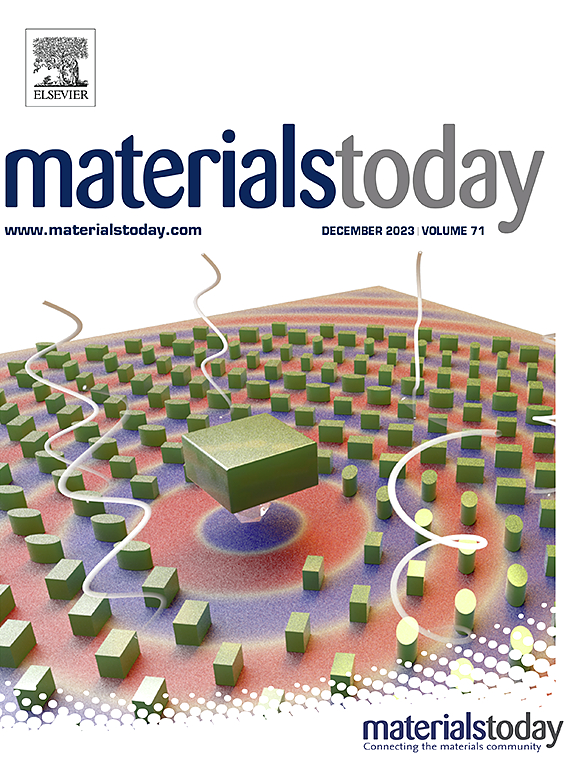通过协同动态反应实现生物启发的 4D 打印再生热固性塑料
IF 22
1区 材料科学
Q1 MATERIALS SCIENCE, MULTIDISCIPLINARY
引用次数: 0
摘要
再生是指生物(如海绵)恢复或替代失去或截肢的身体部位的过程。受这一概念的启发,我们报告了一种通过可逆加成断裂链转移(RAFT)介导的聚合物网络与基于动态交联的无催化剂酯交换的协同耦合实现 4D 印刷热固性光聚合物再生的策略。引入 RAFT 剂可精确调节聚合物网络,生成光响应活聚合物链。动态交联使化学交联聚合物网络在外部刺激下裂解成聚合物链。因此,基于数字光处理(DLP)技术的 4D 打印再生热固性材料可以还原成活的大分子链,并可通过 DLP 3D 打印再生,像海绵一样赋予其第二次生命。此外,再生材料的机械和功能特性可按需调节,促进了 4D 打印聚合物材料的循环提升周期。本文章由计算机程序翻译,如有差异,请以英文原文为准。

Bio-inspired 4D printed regenerative thermosets enabled by synergistic dynamic reactions
Regeneration involves the process by which organisms (e.g. sponges) restore or replace lost or amputated body parts. Inspired by this concept, we report a strategy to realize the regeneration of 4D printed thermosetting photopolymers via synergistic coupling of reversible addition fragmentation chain transfer (RAFT) mediated polymer network and catalyst-free transesterification based dynamic crosslinks. The introduction of RAFT agent can precisely regulate the polymer network and generate the light responsive living polymer chains. The dynamic crosslinks allow the chemically cross-linked polymer network cleavage into polymer chains under external stimuli. Thus, the 4D printed regenerative thermosets based on digital light processing (DLP) technology can be reverted into living macromolecular chains, which can be regenerated by DLP 3D printing, giving them a second life like sponges. Moreover, the mechanical and functional properties of regenerative materials can be regulated on demand, promoting the circular lift cycle of 4D printed polymeric materials.
求助全文
通过发布文献求助,成功后即可免费获取论文全文。
去求助
来源期刊

Materials Today
工程技术-材料科学:综合
CiteScore
36.30
自引率
1.20%
发文量
237
审稿时长
23 days
期刊介绍:
Materials Today is the leading journal in the Materials Today family, focusing on the latest and most impactful work in the materials science community. With a reputation for excellence in news and reviews, the journal has now expanded its coverage to include original research and aims to be at the forefront of the field.
We welcome comprehensive articles, short communications, and review articles from established leaders in the rapidly evolving fields of materials science and related disciplines. We strive to provide authors with rigorous peer review, fast publication, and maximum exposure for their work. While we only accept the most significant manuscripts, our speedy evaluation process ensures that there are no unnecessary publication delays.
 求助内容:
求助内容: 应助结果提醒方式:
应助结果提醒方式:


